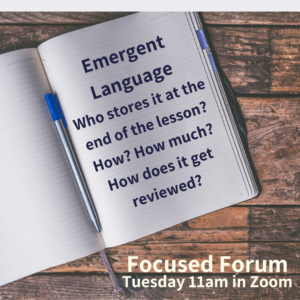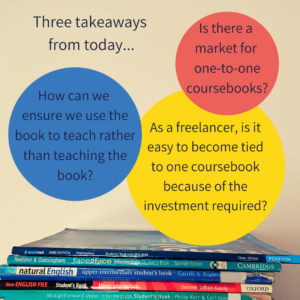Another really interesting meet up… I think we all came away feeling like we are in similar positions with so much in common and that hearing different perspectives is so enriching! Thanks to all for attending.
Hope for the best, plan for the rest?
Of course we touched on what might happen for the new academic year in September. The bottom line is that nobody knows. Where are we going to be with class size restrictions and social distancing? Is it going to be business as usual? Probably not, but now we are selling places that we assume will be there in September. We agreed that the best way forward is to hope for the best but plan for the worst! It may well be that we won’t really know until September.
We also shared our frustration at other schools blatantly disregarding the rules that are causing us so much difficulty.
Green shoots emerging?
This then relates directly to our plans for registration for the coming academic year. We are all working now on student registration and there seem to be some positive signs; there seems to be a tendency for students, who have dropped out over the last 15 months because of the pandemic, to want to return to classes. And those who have been with us throughout are showing good signs of staying on next year.
It appears that the desire to keep moving through the exams as normal and that registrations are similar to normal. There does seem to be some difference in mood depending on the student profiles; location seems to be a factor (city-based schools seem to be busier with exam registrations than those further out) as does the school the students come from (there seems to be more appetite from students from private or semi-private schools rather than state schools, certainly in primary classes).
Free extras; a good idea or not?
We spent some time talking about how we had transitioned (or not!) from offering “free” extra services to charging for them. What “extras” do we offer and which of these do we charge for?
One example was “Exam Strategy Sessions” with extra tips and tricks sessions to help students who want a bit more preparation, the sessions are sold as having a different focus from the normal classes to justify the extra. We talked about other ways to support exam students that want more. Some schools sell the students extra practice books, the “Exam Trainer” books were mentioned as they contain questions to help the learners work through things on their own.
Should we offer extras to “loyal” students or to everyone? Maybe a student who has been with us for a while and is stuck in limbo between levels and needs a bit extra to help them through.
We did acknowledge that “extra” can be very attractive as USPs (Unique Selling Points) that might differentiate from our competition.
One take-away was that people are normally happy to pay extra for something if they feel like they are getting something useful from it.
Does extra help really help?
We talked about “extra help” for students who might be struggling either at school or in our language schools. We asked whether these extra sessions actually worked or not; do students actually get better or does it just make people feel better? Another question was whether extra help might actually be counterproductive; does it just highlight their failure? Are they often too grammar focussed and not really what the student needs?
If we don’t offer this extra help, does it then create problems for students further down the line? We talked about the difficulty around students failing the year, the students are often quite upset but generally, eventually, most people acknowledge it’s the right thing to do. Is it easier to move students mid-year?
We wondered whether there is a time when things naturally fall into place for some of our struggling older primary students. Some of the books we use with older primary students are really difficult, despite our insistence that they don’t need to “learn” the past passive or the second conditional, they just need to meet it and to play with it. Perhaps the change in emphasis and a dialling-down that often happens in early secondary teaching in mainstream schools helps some of our students reset. Often our filters take these into account too as students find their levels (A2.1, A2.2, B1.1 or B1.2) as they transition from primary to secondary levels.
We agreed that what we all want are for our students to be happy in class, confident in class and to feel like they are progressing.
Clarity and transparency, who for?
With students and their families, we agreed, that it’s so important to be honest with them. It may be that our language school is not the best place for some students; perhaps they wouldn’t respond well to communicative methodology, perhaps they need classes to really support their school work. We all believed that this works for everyone in the long-run.
We moved on to talk about how transparent we might want to be with our colleagues. Should we talk about the need for a business to make a profit? Is “profit” a dirty word? We all know, now more than ever, that we need to build up a financial cushion in our businesses as we never know what’s coming round the corner. A business can’t survive and be sustainable without profit and it’s important for all staff to understand this.
Sustainability; people, planet and profit?
And talking of sustainability, we rather liked the alliteration and the appropriacy of the 3 Ps!
We also need to celebrate the wins; in terms of ELT are we helping the planet more with our online and hybrid classes and the decrease in photocopying also in our f2f classes? We’re more aware of the “stuff” we’ve accumulated and have appreciated the opportunities to clear out the junk and then to reuse, recycle or donate. (Does anybody know how to donate old coursebooks?!)





